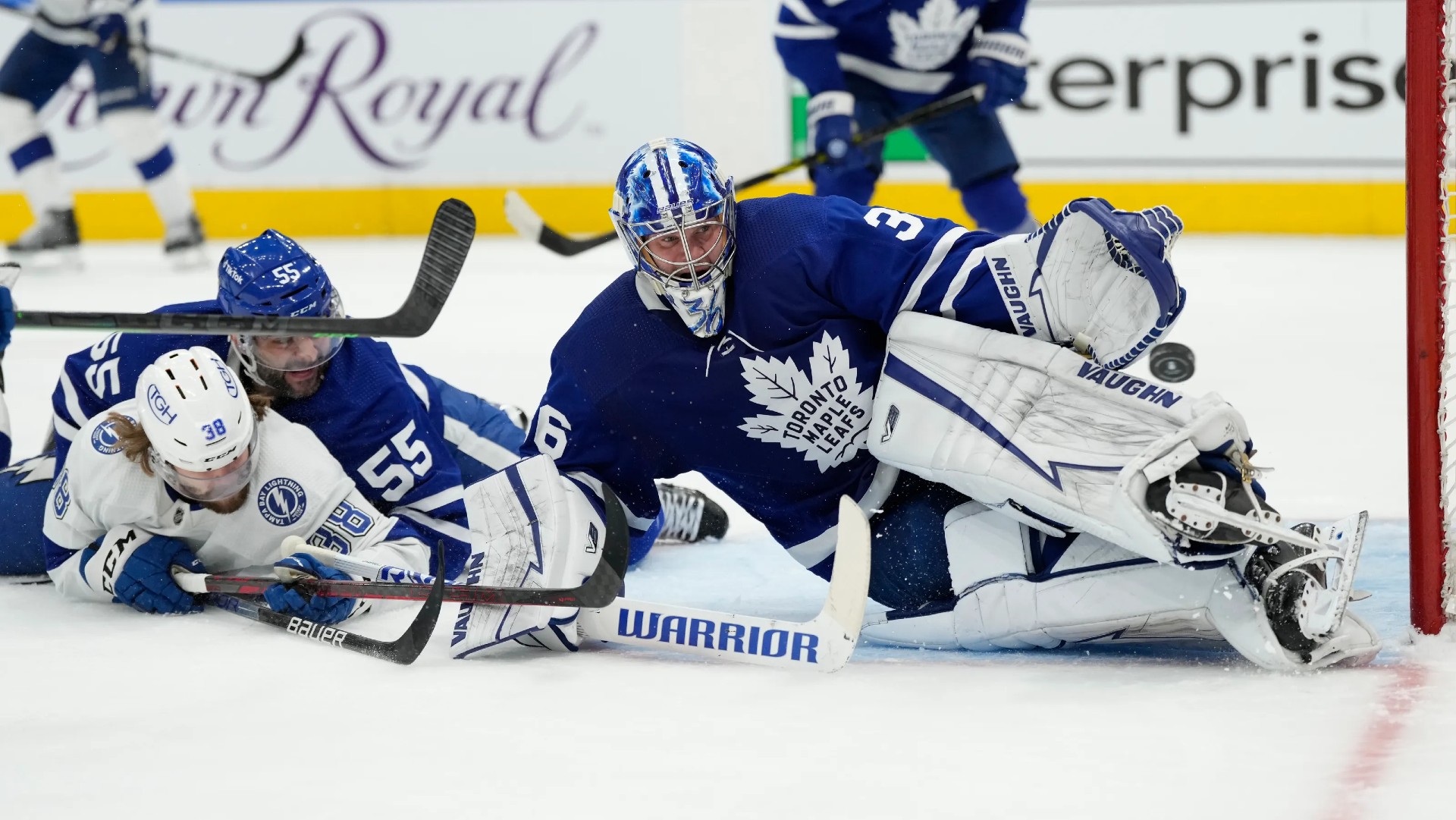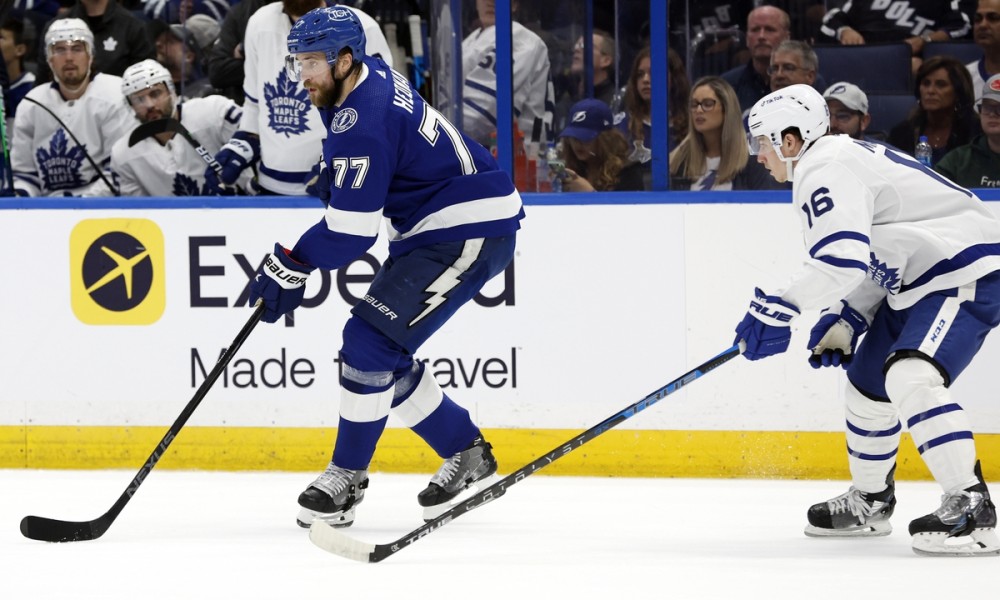When a team finds itself in a playoff pickle — in need of a few big plays to turn things around and regain momentum — it often comes down to their best and most important players.
When Leafs were down in an early 2-0 hole in Game 5, they didn’t need unsung heroes. They just needed their heroes from the regular season to be their heroes in the playoffs. In Game 5, their star players delivered.
A furious rally from the Core Four + Morgan Rielly, helped by tremendous goaltending in the latter half of the game from Jack Campbell, was enough to earn a 3-2 lead in this series, leaving them just one game away from advancing to the second round for the first time since 2004.
Turning Points

The first turning point in this game came after Tampa Bay had already built the 2-0 lead. I didn’t think that Toronto’s start to the game was as slow on the re-watch as it seemed in real-time (more on that later), but regardless, a convergence of factors put the Maple Leafs in a hole early on for the second straight game.
The key to the first period was not letting that hole turn into a kilometer-deep crater as it did in Games 2 (5-1 deficit) and 4 (5-0 deficit). A two-goal deficit with 50 minutes to play isn’t ideal, but it’s not insurmountable; the Leafs erased six two-goal deficits where they ended up winning the game during the season. Three goals becomes quite a bit harder, and four enters “need a miracle” territory. Keeping it to two was paramount.
With 30 seconds left on a penalty kill and under nine minutes to go in the first, the Leafs were called for another penalty, a crosscheck on Mark Giordano. Suddenly, there were another two minutes that needed to be killed, with a half-minute of it 5-on-3 time. Given the damage the Lightning PP had done in the series — and already in the game — a swing moment appeared.
The Lightning ran a set play to create a chance for Brayden Point in the bumper slot and then had two drives by Nikita Kucherov, the latter of which ricocheted outside the zone and set up a breakaway for William Nylander stepping out of the box. Andrei Vasilevskiy stoned him, but the 5v3 was killed, and shortly after, the second penalty was over. The Leafs managed to get to the dressing room only down by two, a turning point that kept Tampa in shouting distance.
The second turning point was the first Toronto goal. Whichever team got the next goal was going to swing the entire feel of the game — and it did, but the effect was even bigger than it may have appeared at the time. The Lightning were whistled for a too-many-men penalty — their second of the game — and the Maple Leafs got another power-play opportunity, one they could ill-afford to squander.
After looking rather raggedy for the first minute of the power play, the Leafs gained the zone and worked the puck to Giordano at the top, who found Nylander on the side. His shot through traffic went in off a skate, officially determined to be that of John Tavares (although it seemed to hit Tavares and then Mikhail Sergachev), and went behind Vasilevskiy:
WILLIAM NYLANDER 🚨
THE LEAFS ARE ON THE BOARD pic.twitter.com/RPs8pJp4Sd
— Omar (@TicTacTOmar) May 11, 2022
The Lightning had dictated play and gotten better looks through the first 23.5 minutes, but the Leafs then started to gain a foothold in the game and were finding a rhythm again at 5v5 — something that was missing from the third period of Game 3 through the first period of Game 5.
By the midway point of the second period, the Leafs were buzzing. An onslaught of chances ensued and the Leafs broke through in the early third, putting two goals behind Vasilevskiy. It all started with the much-needed spark from the Tavares power-play goal.
The third turning point was a pair of chances with under 10 minutes to go and the score at 3-3. The Leafs had taken a brief lead on a William Nylander tally, followed by the Tampa equalizer off of the stick of Ryan McDonagh. With the game tied at 3-3, the clock ticking down, and each shot taking on greater significance, a defensive-zone faceoff was taken by Toronto’s fourth line.
They were unable to win it, the puck cycled around, Ondrej Kaše had a chance to clear, and he chose to pass laterally across the defensive zone. The puck went to Cal Foote at the point, who put a shot to the net, tipped by Steven Stamkos. Jack Campbell made the first stop, but the rebound went right to Nikita Kucherov, who had an A+ scoring chance. Campbell came up with a massive save:
JACK CAMPBELL YOU BEAUTIFUL GOALIE pic.twitter.com/19Erz6tW4M
— Omar (@TicTacTOmar) May 11, 2022
A premium chance for Tampa to retake the lead for the third time was denied, and less than two minutes later, the Leafs grabbed the lead and didn’t look back.
Jake Muzzin stood up a Tampa play through the center ice area before Michael Bunting snagged the loose puck and hit Mitch Marner, who came in on a 2v1 with Auston Matthews. Marner then executed the pass off Vasilevskiy’s pads to perfection, leaving the puck right for Matthews with an empty net.
The goal went in, the lead was 4-3 Toronto, and suddenly, they were just six minutes away from closing the game out. The Kucherov chance proved to be the last best chance Tampa generated, and the Matthews goal stood up as the game-winner.
Notable Performances

If I had to pick a fourth turning point, it would’ve been another Jack Campbell save, so let’s start with him. The Leaf netminder was not perfect, but he did enough, and for the third time in this series, he was the better goalie. The Leafs have come away with wins in all three games in which that was the case.
The first goal by Stamkos was one that Campbell definitely had a chance on, but it wasn’t a howler. The second goal he never saw through a perfect Alex Killorn screen, and the third one Campbell was only saving if the jackhammer slapshot had hit him stationary; the reaction time was zilch.
Overall, I don’t fault him too much on those goals, and he made several massive, momentum-swinging stops. He made a few saves on the aforementioned penalty kill in the first, stoned the Kucherov chance late, and in-between times, successfully defended two Nick Paul breakaways.
One came when the Leafs were on the PP, the other when Ondrej Palat stripped Morgan Rielly at center and sent Paul on a break:
Massive save from Jack Campbell pic.twitter.com/24gEfvBGDz
— Omar (@TicTacTOmar) May 11, 2022
If either of those pucks goes in, the Leafs likely do not win the game. Campbell’s ability to shake off rocky performances and bounce back with huge games in both Game 3 and Game 5 have been massive for the Leafs in this series. Now, can he pitch one more gem to finish the series off?
As has been written by numerous other writers, the core stepped up big time for the Leafs. The echoes of angry Leaf fans reaming John Tavares during the first period were cacophonous, but the captain delivered. His goal was more luck than anything else, but it’s still big to get him on the scoresheet, and the pass he made to Rielly for the second goal was the highlight of his game:
MORGAN RIELLY 🚨
CAPTAIN MORGAN! TIE GAME! JT WHAT A PLAY! pic.twitter.com/pBskugtVZ5
— Omar (@TicTacTOmar) May 11, 2022
Tavares’ numbers at 5v5 were not particularly great, but that play made during the 4v4 and his PPG were both massive moments in this one. He deserves credit for delivering key plays at key moments in the game.
William Nylander was an even bigger factor. He finished with the best xGF% at even strength of any Leaf — excellent at 5v5 and also dominant on the 4v4 — not to mention the primary assist on the Tavares power-play tally. Chances against were minimal with Nylander on the ice at even strength, and he showed off so much of his toolkit: the skating, the shot, the passing, the ability to take over a shift.
It was a three-point night for him, with good defensive impacts as well (something you can’t always say about Nylander). For all the flak Nylander took over the infamous shift in Game 4, he has continued to establish himself as Toronto’s best playoff performer among the forward group in the last two playoffs. This was a massive bounce-back effort from #88 at a time when the pitchforks were out and sharpened in certain corners of the market.
Auston Matthews and Mitch Marner had a direct hand in only one goal, but it was the biggest one. Moreover, the one point each in this one doesn’t reflect the offense they were generating. They both played over 23 minutes in this game — greater than six minutes more than any other Leaf forward — and they dominated those minutes.
Toronto owned over 70% of the scoring chances and over 80% of the high-danger chances with those two on the ice at 5v5, and Marner again logged heavy time on the PK. Their play for the game-winner was magnificent, but their physical play was perhaps most notable. Matthews logged seven hits, while Marner was second on the team with four. The Matthews hit on Sergachev was a cruncher:
Matthews finishes his check on Sergachev pic.twitter.com/1YSopTTmt3
— Omar (@TicTacTOmar) May 11, 2022
After two quiet outings at Amalie Arena, the two superstars were back with a vengeance for the Maple Leafs. The Leafs were able to get the matchups they wanted for their big guns using the benefit of the last change at home. Now the question is whether Marner and Matthews can replicate that effort when Jon Cooper can scheme his preferred matchups in Game 6.
Morgan Rielly had a rather up-and-down performance, with the ugly giveaway on the Paul breakaway, but his goal was a perfectly-placed shot to ensure Vasilevskiy had no opportunity to make a save. Every Leafs player who is signed for next season with an AAV of >$6.5 M got on the scoresheet and none got flukey secondary assists. All played critical roles in at least one goal for the Leafs.
The Leafs leaned heavily on the two non-Rielly pairs down the stretch, and of those two, I thought Mark Giordano and Justin Holl had the better night. Very little happened defensively when those two were out there, while the Leafs got plenty of offensive chances at the other end.
Holl, in particular, shone just a couple of days after yet another outrage cycle about Sheldon Keefe’s decision to put Holl in the lineup. The Leafs owned 81.2% of the expected goals at even strength with Holl on the ice in Evolving Hockey’s data, and his pass up the wall to Ilya Mikheyev, past Victor Hedman, to set up the Nylander goal was terrific:
LEAFS HAVE THE LEAD pic.twitter.com/NZkRWq2kOg
— Omar (@TicTacTOmar) May 11, 2022
Holl also logged a team-high 2:27 on the PK and his ability to clear the puck with relative ease was massive late in the game. The same could be said for Giordano, whose late-game clear nearly went in the empty net. Giordano also featured heavily on the PP and picked up an assist on the Tavares goal. It’s hard to picture Toronto on the brink of knocking out the defending champs without the trade for Giordano.
The other pair of TJ Brodie and Jake Muzzin was not as good as they have been in past games. They were on the ice for both the first and third Tampa goals, although I’m not sure either did anything wrong on those two goals. Brodie did take a hooking call after getting beat in the corner by Nick Paul, which gave Tampa a PP they eventually scored on, but Natural Stat Trick did have the Leafs winning scoring chances and high-danger chances with those two on the ice at 5v5.
To their credit, Muzzin made a good play in the neutral zone to begin the Matthews goal, and both logged heavy time late in the game. Muzzin, in particular, had a good clear of the puck with a minute to go. Each played over 90 seconds on the PK in this one as well.
The third line of David Kämpf, Ilya Mikheyev, and Pierre Engvall was quieter in this one, but they did draw tough matchups. Give them praise for effective forechecking in the final six minutes to bring the game to a close.
The fourth line played only four minutes at 5v5 and was responsible for Kucherov’s chance in the third, but I feel it is important to point out that Jason Spezza seemed to have the most jump on the Leafs early on, delivering a big hit and creating a chance in the first period. We also learned after the game of his motivational speech in the locker room in the first intermission, which deserves a shoutout.
Storylines for Game 6

1. Much was made of the Leafs’ slow start in this game on social media, but I think I’m in agreement with Anthony Petrielli that the narrative didn’t quite match up with reality. The first five minutes were not terrible, with Marner going on a breakaway chance that Vasilveskiy and Anthony Cirelli denied before the Leafs went on a PP. They didn’t do enough with it, but shots were 1-1 through five minutes and neither team had scored.
To conflate that with Game 4, where it was 2-0 before you could blink, isn’t correct. Rather, the Lightning got a quick opportunity and converted, and then scored on the PPG, with things getting lopsided after that happened (up until the Tavares goal). I think there’s a case that the first period looks very different if Marner scores on that break.
Either way, 5v5 play was not all that decisive, with shot attempts close to even and scoring chances actually favoring the Maple Leafs. It was just down to the ability of Tampa to finish their chances (and that the Lightning got the early PPs).
Still, the Leafs will need to be ready from the start for Game 6. Scoring that first goal will be pivotal, although this game did finally end the streak of the team scoring first winning the game. A start like Game 3 would be optimal — a quick couple of goals to settle the Leafs in and let them play with confidence and a lead.
Toronto returns to the brink of victory for the first time since late last May, and we don’t need to rehash how poor of starts they got out to in the three clinching opportunities last year. Can’t happen this time.
2. In my analysis after Game 4, I wrote:
“Breakouts, breakouts, breakouts. The Leafs have not been able to get out of their own zone with consistency for multiple games in a row now. It was somewhat of an issue in Game 2, gave them fits in Game 3, and morphed into a full-blown five-alarm fire in Game 4.”
The issue with breakouts was far reduced in Game 5, something that really stood out on re-watch. I could count on one hand the number of times the Leafs were unable to clear, leading to an extended Tampa possession. Two of those did result in goals — which is obviously not good — but neither was due to good plays by the Bolts. Both — the Marner decision to reverse instead of chip and Kaše’s decision to pass instead of clear — were mental errors rather than good pressure from the Lightning.
The message should be clear by now that if you’re on the wall in the defensive zone with a chance to clear, the puck needs to go out. You cannot risk disaster because you want to set up a fancy breakout.
However, outside of those couple miscues, the Leafs really didn’t have the issues they had previously with the Tampa forecheck, which was the biggest reason they were able to get the game to the finish line without much issue after going up 4-3. Defensemen were calm and accurate with their first passes, the Leafs won races and physical battles for puck retrievals, and the forwards helped their defensemen out more.
Ilya Lyubushkin had one memorable blunder facilitating a breakout — he remains a liability in the zone exit facet of the game — but otherwise, this was a stellar performance. If the Leafs can replicate this in Game 6, they have a very good chance of ending the series in Tampa.
3. I don’t anticipate any lineup changes for Game 6. While I would advocate for swapping Lyubushkin out for Timothy Liljegren, Keefe seems determined to stick with these defense pairs, and I think they’ve found the optimal forwards. The fourth line was not used much, but having seen Wayne Simmonds and Kyle Clifford on that line, it’s clear to me that Spezza is the one who deserves to be on it the most right now.
The leadership and oomph Spezza gives the second PP unit are far more valuable. And if Marner and Matthews are going to be throwing the body around, I’m not sure how much of a need there is for a physical grinder. To me, this looks like the 18 skaters and a starting goalie who are going to be the group to either get it done or not.
4. Matchups will be so critical again in Game 6 on the road. Jon Cooper was shuffling his top two lines mid-game, with five different variations playing at least 1:55 at 5v5 for the Lightning last night. Lines involving Kucherov seemed to have the most success, but what was an interesting development was that Matthews and Marner played a good chunk against the same players who had muzzled them in Game 4 (Point/Cirelli/ Killorn/Hedman/Cernak), only they had far more success.
After being held to <20% xGF% at 5v5 against most of those players in Game 4, Matthews was humming in the 80% range in Game 5. If he and Marner can keep that going, the discussion of matchup advantages may not be as worthwhile and Tampa’s home-ice edge could be neutralized.
5. Well, here we go again. Another chance to finally get over the hump. This group had one crack in 2018, two cracks in 2019, one crack in 2020, and three cracks in 2021. If you’re not good at math, that’s 0/7. Now they get two more, and Game 6 will be swing #1 at it.
While I would still like Toronto’s chances in Game 7 (with a lively home crowd behind them and the benefit of last change), everyone wants to see the series end tomorrow night. Put it away and don’t leave the door ajar, as the Leafs did in both Game 5 and Game 6 last season.
This is the third time in the series that the Leafs are going into a game coming off a win, which also means it’s time to repeat the fact about Tampa not losing back-to-back playoff games since 2019. The Lightning are exceptional at bouncing back, and the Leafs have won one playoff game with a lead in a series during the Matthews/Marner era.
It’s a team that cannot lose two straight against one that cannot play from ahead. That’s one more narrative that needs to be reversed in this series, in addition to the gargantuan one that would be rewritten if the Leafs advance.
The Leafs have not had much juice in a game with a chance to eliminate an opponent since Morgan Rielly scored first in Game 6 of 2019, so how the game starts is critical. Amazingly, Tampa has not trailed 3-2 in a series since the 2015 Stanley Cup Finals (!), a series they lost in six. That was a looooooong time ago, and so it will be a moderately unfamiliar terrain for Tampa, while the Leafs will be in a position they know all too well.
Beating Tampa in four out of seven was going to be difficult no matter what, but everyone knew that the hardest part was going to be the fourth win. It’s the final mental hurdle for this group, and a chance to change everything critics believe to be true about this Maple Leafs core.
In many ways, that’s the only storyline for Game 6.

































